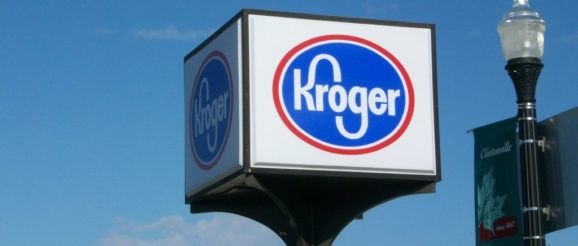Kroger opens innovation lab at the University of Cincinnati

Dive Brief:
- The Cincinnati-based grocer will staff the university’s Innovation Hub with resources including R&D engineers and software developers, who will work with the school’s faculty. The partnership will also provide a student co-op and internship program.
- The hub is made up of a 12,000-square-feet makerspace and micro-factory, state-of-the-art classrooms, and multipurpose rooms. Construction of Kroger’s 2,500-square-feet innovation lab is expected to be complete in October.
Dive Insight:
As a leader in grocery innovation, Kroger continues to take steps to remain near the top of a tight market and is again creating a path likely to be followed by its competitors. By teaming up with the University of Cincinnati, Kroger is signaling its investment in attracting young talent to an industry currently dominated by older men, especially at the executive level. While grocers know that staying relevant to millennials and Gen Z shoppers is key to reinvigorating the stale space, many are still figuring out what that means to their operations. The new lab, however, could help Kroger do just that. With opportunities for internships and co-ops, the partnership will help create a pipeline of students who may not have originally considered the grocery industry as a possible breeding ground for tech innovation.
While Kroger appears to be the first grocer in the U.S. to work with a university, Big Food brands are seasoned partners with colleges. Late last year, Ferrero International, an Italian chocolate giant, established an innovation center on Cornell University’s technology campus. It gave the company an opportunity to develop new technologies and recruit students to join the company.
Universities welcome well-known companies to use their facilities to conduct research because it brings them accreditation, as well as increased recruitment of their students. The Whistler Center of Carbohydrate Research at Purdue University is known to have many food companies as its members including Nestlé, General Mills and Mondelez International. The types of on-campus research jobs these labs provide are appealing to students and give companies a chance to show off the work they do as well as the opportunities available.
The partnership with the University of Cincinnati is just one of many recent actions that are part of the grocer’s Restock Kroger plan, aimed to “strategically repositioning Kroger to accelerate customer-centered efforts in order to create shareholder value.” In May, the company signed an exclusive deal with Ocado to bring its automated facilities to the U.S. and help Kroger lead the competitive e-commerce space. The company also recently announced it will pilot its autonomous grocery delivery service in Scottsdale, Arizona, and rolled out Kroger EDGE, its digital shelf display technology.
Already a tech hub, Kroger’s innovation lab could catapult it ahead of other grocers depending on what is developed by its research students. It’s possible, however, that despite new innovations, the lab could be a worthwhile investment for Kroger if it is able to attract top new talent that can grow the industry in the upcoming years.
